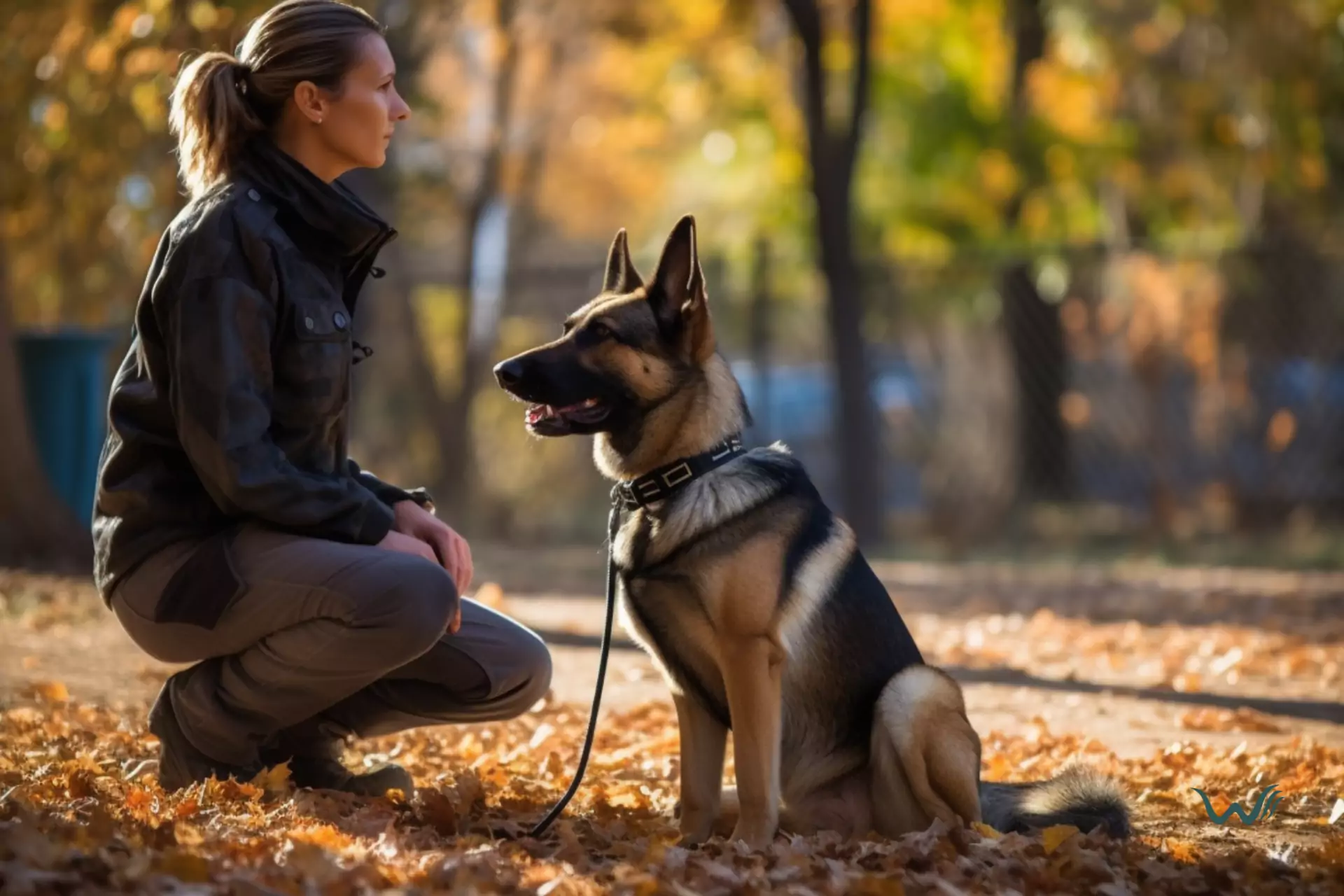

What Causes Dogs To Become Aggressive?
by Haley Mills
Last updated: April 22, 2024
Verified and Approved by:
Angela Morris,
MSW, LCSW
Fact Checked

Aggression in dogs is a complex issue that can have various underlying causes. Understanding what triggers aggressive behavior in dogs is crucial for their wellbeing and the safety of those around them.
This article will explore the different factors that can contribute to a dog’s aggression, including socialization and early training, fear and anxiety, medical conditions and pain, environmental factors and lack of proper care.
The causes of aggression in dogs are multifaceted and can stem from various factors. Understanding and addressing these underlying causes is essential for effectively managing and preventing aggressive behavior in dogs. By providing proper socialization, training, addressing fear and anxiety, seeking veterinary care, and ensuring a nurturing environment, dog owners can help create a safe and harmonious relationship with their canine companions.
Understanding Aggressive Behavior in Dogs
Aggression in dogs can stem from a variety of factors, one of which is a genetic predisposition. Some dogs are simply born more likely to display aggressive behaviors due to their genetic makeup. Certain breeds, such as Pit Bulls or Rottweilers, have been historically bred for traits that can make them more prone to aggression. However, it’s important to note that genetics alone don’t determine a dog’s behavior.
Environmental factors and proper training are crucial in shaping a dog’s behavior. Another factor contributing to aggressive behavior in dogs is a lack of proper discipline. Dogs, like humans, need boundaries and structure to thrive. Without consistent and fair discipline, they may become confused and anxious, which can manifest as aggression.
Dogs that haven’t been properly socialized or trained may have difficulty understanding what’s expected of them and may resort to aggressive behaviors as a means of communication or defense. It’s essential for dog owners to establish clear rules and boundaries and to provide their dogs with positive reinforcement training to prevent aggression from developing.
Socialization and Early Training
Early socialization focuses on exposing puppies to various people, animals, and environments, which helps them develop confidence and reduces the likelihood of fear-based aggression later in life.
Positive reinforcement techniques involve rewarding desired behaviors rather than punishing unwanted behaviors. This approach helps dogs associate positive experiences with certain actions, making them more likely to repeat those behaviors in the future. For example, when a puppy sits on command, they may receive a treat or praise, reinforcing the idea that sitting is desirable. This technique can be used to teach dogs appropriate responses to various situations, reducing the likelihood of aggressive behavior.
Early socialization is also crucial in preventing aggression. During the critical socialization period, which typically occurs between 3 and 14 weeks of age, puppies are highly receptive to new experiences and are more likely to form positive associations. By introducing puppies to different people, animals, and environments during this period, they become accustomed to a wide range of stimuli and are less likely to react aggressively when encountering them later in life.
Fear and Anxiety as Triggers
Fear and anxiety can often trigger a dog’s aggressive behavior. Dogs, like humans, can experience fear and anxiety in certain situations, and these emotions can lead to aggressive responses.
There are several key factors that can contribute to fear and anxiety in dogs.
- Genetics and temperament: Some dogs may be genetically predisposed to being more fearful or anxious. Certain breeds are more prone to anxiety-related behaviors, while individual temperament can also play a role. Dogs with a naturally timid or fearful disposition may be more likely to respond aggressively when they feel threatened or scared.
- Traumatic experiences and past abuse: Dogs that have experienced traumatic events or past abuse are more likely to develop fear and anxiety. These experiences can impact a dog’s behavior and their ability to trust humans or other animals. Dogs that have been mistreated or neglected may exhibit aggression as a defense mechanism to protect themselves from perceived threats.
- Lack of socialization: Dogs that have not been adequately socialized during their critical developmental period may be more prone to fear and anxiety. Socialization involves exposing dogs to a wide variety of people, animals, and environments in a positive and controlled manner. Without proper socialization, dogs may become fearful and anxious in new or unfamiliar situations, leading to aggressive behavior to cope with their discomfort.
Medical Conditions and Pain
Certain medical conditions, such as hormonal imbalances or neurological disorders, can result in aggression in dogs. For example, a dog with hypothyroidism may exhibit aggressive behavior due to the imbalance of thyroid hormones in their body. Similarly, dogs with neurological problems, such as brain tumors or seizures, may become aggressive as a result of the pain and confusion caused by these conditions. It is important to note that genetics and breed predispositions can also play a role in a dog’s susceptibility to certain medical conditions that can lead to aggression.
In addition to medical conditions, trauma and past experiences can also contribute to a dog’s aggressive behavior. Dogs subjected to abuse, neglect, or traumatic events may develop aggression as a defense mechanism. These experiences can cause fear, anxiety, and a heightened sense of aggression in dogs.
Furthermore, dogs that have not been properly socialized or trained may also exhibit aggression due to their lack of understanding of appropriate behavior. It is important for dog owners to recognize the impact of past experiences on their dog’s behavior and to provide the necessary support and training to help them overcome their aggression.
In some cases, professional help from a veterinarian or animal behaviorist may be required to address the underlying medical conditions or trauma that are contributing to the dog’s aggression.
Can Aggressive Behavior in Dogs be Modified through Training Techniques?
Yes, aggressive behavior in dogs can often be modified through various training techniques. By training dogs to modify behavior, such as desensitization, counter-conditioning, and positive reinforcement, owners can help their pets become more socialized and less prone to reacting aggressively in certain situations.
– Can Hiccups in Dogs Lead to Aggressive Behavior?
If you are looking for dogs and hiccups information, rest assured that hiccups in dogs typically do not lead to aggressive behavior. Hiccups are a reflexive action and are not typically associated with aggression in canines. However, if you are concerned about your dog’s behavior, consult a veterinarian for professional guidance.
Environmental Factors and Lack of Proper Care
One major factor in dogs becoming aggressive can be a lack of proper care and an unfavorable environment. Dogs neglected or abandoned by their owners often experience feelings of fear, anxiety, and insecurity, which can manifest as aggression. Similarly, dogs not provided with adequate exercise and stimulation may become frustrated and develop aggressive behaviors to release their pent-up energy.
To further emphasize this point, here are three specific environmental factors and lack of proper care that can contribute to a dog’s aggression:
- Neglect and abandonment: Dogs are social animals that thrive on human companionship. When they’re left alone for extended periods without any interaction or attention, they can become emotionally distressed. This can lead to behavioral problems, including aggression, as they may need to assert themselves or protect themselves from perceived threats.
- Inadequate exercise: Dogs require regular physical exercise to stay healthy and mentally stimulated. Without proper exercise, they may become bored, frustrated, and restless, which can manifest as aggression. A lack of physical activity can also lead to weight gain and other health issues, further exacerbating their aggression.
- Lack of mental stimulation: Dogs also need mental stimulation to prevent boredom and destructive behaviors. They may resort to aggression without enough mental challenges to alleviate their frustration. Providing them with interactive toys, puzzle feeders, and training exercises can help keep their minds engaged and prevent the development of aggressive tendencies.
Frequently Asked Questions
How can I tell if my dog is showing aggression due to fear and anxiety?
To determine if your dog is showing aggression due to fear and anxiety, look for signs such as growling, barking, or biting when confronted with specific triggers. Strategies like positive reinforcement training and desensitization can help manage fear and anxiety in dogs.
Are certain dog breeds more prone to aggressive behavior than others?
Certain dog breeds may have a higher predisposition to aggressive behavior due to their genetics. However, aggression is a complex trait influenced by both genetics and environmental factors. Breed-specific legislation has been implemented in some areas to prevent dog aggression, but its effectiveness is a subject of debate.
Can a dog’s aggressive behavior be completely eliminated through training and socialization?
The aggressive behavior of dogs can be reduced through training and socialization, but complete elimination may not be possible. The role of genetics in dog aggression and the impact of early experiences are essential factors to consider.
What are some common medical conditions that can cause dogs to become aggressive?
Neurological disorders, such as brain tumors or epilepsy, can lead to dog aggression. Additionally, hormonal imbalances, such as hypothyroidism or Cushing’s disease, may also contribute to aggressive behavior. Medical evaluation is crucial to address these underlying conditions.
How can I prevent my dog from developing aggressive behavior due to environmental factors and lack of proper care?
Early socialization is crucial in preventing aggression in dogs. Introducing them to various people, animals, and environments helps them develop positive associations. Additionally, effective techniques for managing fear-based aggression include desensitization, counter-conditioning, and positive reinforcement training.
Certify Your Emotional Support Animal Today

Why You Can Rely on Us?
At Wellness Wag, we believe your pet deserves care rooted in both science and compassion. Each article is carefully researched, written in clear language for pet owners, and then reviewed by qualified professionals to ensure the information is evidence-based, current, and practical for real-life care. Our goal is to help you feel confident in making informed decisions about your pet’s health and well-being.
Reviewed by
Angela Morris, MSW, LCSW
Angela is a licensed clinical social worker with 20 years of experience in patient advocacy and community mental health. She has assisted numerous clients with ESA evaluations and brings a deep understanding of disability accommodations, ensuring that all information is accurate, supportive, and practical.

Written by :
Haley Mills
Last Updated :
April 22, 2024










